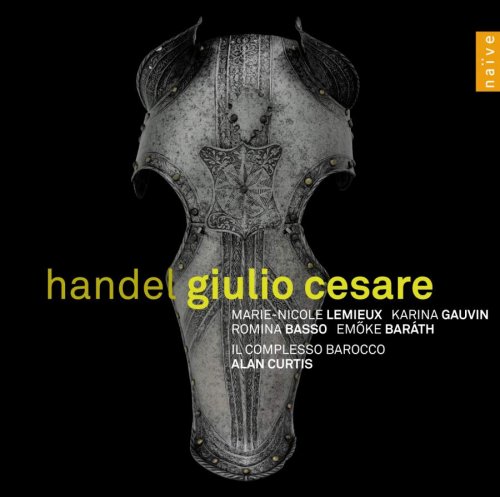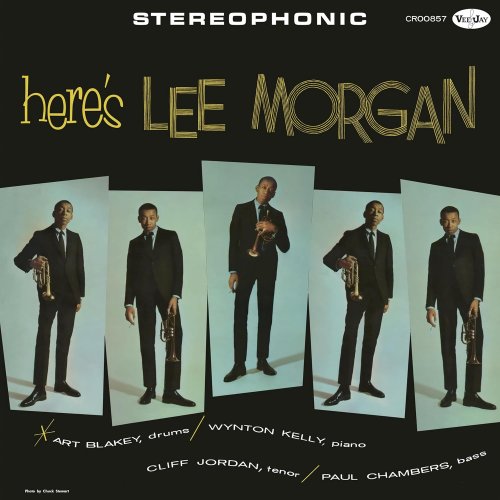Alan Curtis - Handel: Giulio Cesare in Egitto (2012) [Hi-Res]

Artist: Alan Curtis, Marie-Nicole Lemieux, Karina Gauvin, Romina Basso, Emoke Barath, Filippo Mineccia, Johannes Weisser, Milena Storti, Gianluca Buratto, Il Complesso Barocco
Title: Handel: Giulio Cesare in Egitto
Year Of Release: 2012
Label: Naive
Genre: Classical
Quality: FLAC (tracks + booklet) [44.1kHz/24bit] / FLAC (image + .cue, log, artwork)
Total Time: 03:39:52
Total Size: 2.18 / 1.22 GB
WebSite: Album Preview
Title: Handel: Giulio Cesare in Egitto
Year Of Release: 2012
Label: Naive
Genre: Classical
Quality: FLAC (tracks + booklet) [44.1kHz/24bit] / FLAC (image + .cue, log, artwork)
Total Time: 03:39:52
Total Size: 2.18 / 1.22 GB
WebSite: Album Preview
Performers:
Marie-Nicole Lemieux (Giulio Cesare)
Karina Gauvin (Cleopatra)
Romina Basso (Cornelia)
Emoke Barath (Sesto)
Filippo Mineccia (Tolomeo)
Johannes Weisser (Achilla)
Milena Storti (Nireno)
Gianluca Buratto (Curio)
Il Complesso Barocco
Alan Curtis
This recording of Handel's big opera about Caesar and Cleopatra features an American conductor and a European orchestra, and a supporting cast from all over. But the real stars, and reasons enough for purchase on their own, are a pair of French Canadians. Marie-Nicole Lemieux proceeds without stress in the difficult role of Caesar, originally written for the castrato Senesino and a beast of a challenge for other singers, male or female, ever since. Lemieux's job is made all the more difficult by conductor Alan Curtis' fast tempi, which he justifies fairly convincingly in a booklet note. Perhaps even more seductive for the buyer is soprano Karina Gauvin as Cleopatra. Gauvin has been called the Renée Fleming of Baroque music, to which one might object that Renée Fleming is the Renée Fleming of Baroque music. But Gauvin can stand the comparison. Sample the aria "Se pietà di me non senti," CD 2, track 25, for an instance of the creamy power that is gaining Gauvin a legion of followers that just a few Baroque specialists have matched. The opera is a monster even at Curtis' fast clip, and even as he varies the configuration of his continuo group in what generally can be called a state-of-the-art performance. But many of the singers of the smaller roles have a fine dramatic sense, none more than countertenor Filippo Mineccia as the villainous Tolomeo. This merits strong consideration, especially for those looking for a period-instrument performance to go with the classic Beverly Sills reading. -- James Manheim
Marie-Nicole Lemieux (Giulio Cesare)
Karina Gauvin (Cleopatra)
Romina Basso (Cornelia)
Emoke Barath (Sesto)
Filippo Mineccia (Tolomeo)
Johannes Weisser (Achilla)
Milena Storti (Nireno)
Gianluca Buratto (Curio)
Il Complesso Barocco
Alan Curtis
This recording of Handel's big opera about Caesar and Cleopatra features an American conductor and a European orchestra, and a supporting cast from all over. But the real stars, and reasons enough for purchase on their own, are a pair of French Canadians. Marie-Nicole Lemieux proceeds without stress in the difficult role of Caesar, originally written for the castrato Senesino and a beast of a challenge for other singers, male or female, ever since. Lemieux's job is made all the more difficult by conductor Alan Curtis' fast tempi, which he justifies fairly convincingly in a booklet note. Perhaps even more seductive for the buyer is soprano Karina Gauvin as Cleopatra. Gauvin has been called the Renée Fleming of Baroque music, to which one might object that Renée Fleming is the Renée Fleming of Baroque music. But Gauvin can stand the comparison. Sample the aria "Se pietà di me non senti," CD 2, track 25, for an instance of the creamy power that is gaining Gauvin a legion of followers that just a few Baroque specialists have matched. The opera is a monster even at Curtis' fast clip, and even as he varies the configuration of his continuo group in what generally can be called a state-of-the-art performance. But many of the singers of the smaller roles have a fine dramatic sense, none more than countertenor Filippo Mineccia as the villainous Tolomeo. This merits strong consideration, especially for those looking for a period-instrument performance to go with the classic Beverly Sills reading. -- James Manheim




![Sibel Köse Septet - In Good Company (2025) [Hi-Res] Sibel Köse Septet - In Good Company (2025) [Hi-Res]](https://www.dibpic.com/uploads/posts/2025-12/1765846644_uizwujac4ht2d_600.jpg)


![The Mood Mosaic - Funk 'n' Roll (2025) [Hi-Res] The Mood Mosaic - Funk 'n' Roll (2025) [Hi-Res]](https://www.dibpic.com/uploads/posts/2025-12/1765495597_fei4b1bbm7qjr_600.jpg)
![Thomas Wenglinski - Something Always Happens (2025) [Hi-Res] Thomas Wenglinski - Something Always Happens (2025) [Hi-Res]](https://www.dibpic.com/uploads/posts/2025-12/1765497916_fg7n35hdbubsa_600.jpg)
![Kenny Wheeler, Keith Jarrett, Dave Holland & Jack DeJohnette - Gnu High (1976/2025) [Hi-Res] Kenny Wheeler, Keith Jarrett, Dave Holland & Jack DeJohnette - Gnu High (1976/2025) [Hi-Res]](https://www.dibpic.com/uploads/posts/2025-12/1765627312_cover.jpg)